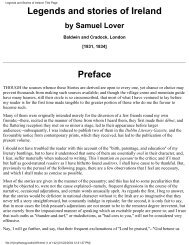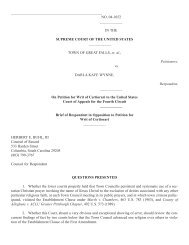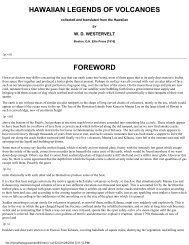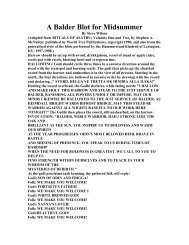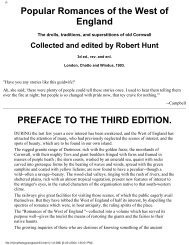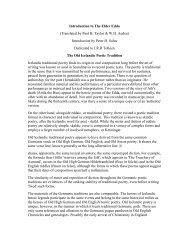You also want an ePaper? Increase the reach of your titles
YUMPU automatically turns print PDFs into web optimized ePapers that Google loves.
giving the origin of a certain Trinio, of whom Mapes had more to say:--<br />
Aliud non miraculum sed portentum nobis Walenses referunt. Wastinum Wastiniauc secus stagnum Brekeinauc [read Brecheinauc], quod<br />
in circuitu duo miliaria tenet, mansisse aiunt et vidisse per tres claras a luna noctes choreas fæminarum in campo avenæ, suæ, et secutum<br />
eum eas fuisse donec in aqua stagni submergerentur, unam tamen quarta vice retinuisse. Narrabat etiam ille raptor illius quod eas<br />
noctibus singulis post submersionem earum murmurantes audisset sub aqua et dicentes, 'Si hoc fecisset, unam de nobis cepisset,' et se ab<br />
ipsis edoctum quomodo hanc adepta [read -us] sit, qua, et consensit et nupsit ei, et prima verba sua hæc ad virum suum, 'Libens tibi<br />
serviam, et tota obedientiæ devotione usque in diem illum prosilire volens ad clamores ultra Lenem [read Leueni] me freno tuo<br />
percusseris.' Est autem Leueni aqua vicina stagno. Quod et factum est; post plurimæ, prolis susceptionem ab eo freno percussa est, et in<br />
reditu suo inventam eam fugientem cum prole, insecutus est, et vix unum ax filiis suis arripuit, nomine Triunem Uagelauc.<br />
'The Welsh relate to us another thing, not so much a miracle as a portent, as follows. They say that Gwestin of Gwestiniog dwelt beside<br />
Brecknock Mere, which has a circumference of two miles, and that on three moonlight nights he saw in his field of oats women dancing,<br />
and that he followed them until they sank in the water of the mere; but the fourth time they say that he seized hold of one of them. Her<br />
captor further used to relate that on each of these nights he had heard the women, after plunging into the mere, murmuring beneath the<br />
water and saying, "If he had done so and so, he would have caught one of us," and that he had been instructed by their own words,<br />
p. 72<br />
as to the manner in which he caught her. She both yielded and became his wife, and her first words to her husband were these: "Willingly<br />
will I serve thee, and with whole-hearted obedience, until that day when, desirous of sallying forth in the direction of the cries beyond the<br />
Llyfni, thou shalt strike me with thy bridle"--the Llyfni is a burn near the mere. And this came to pass: after presenting him with a<br />
numerous offspring she was struck by him with the bridle, and on his returning home, he found her running away with her offspring, and<br />
he pursued her, but it was with difficulty that he got hold even of one of his sons, and he was named Trinio (?) Faglog.'<br />
The story, as it proceeds, mentions Trinio engaged in battle with the men of a prince who seems to have been no other than Brychan of<br />
Brycheiniog, supposed to have died about the middle of the fifth century. The battle was disastrous to Trinio and his friends, and Trinio<br />
was never seen afterwards; so Walter Mapes reports the fact that people believed him to have been rescued by his mother, and that he was<br />
with her living still in the lake. Giraldus calls it lacus ille de Brecheniauc magnus et famosus, quem et Clamosum dicunt, 'that great and<br />
famous lake of Brecknock which they also call Clamosus,' suggested by the Welsh Lyn Llefni, so called from the river Llefni,<br />
misinterpreted as if derived from llef 'a cry.' With this lake he connects the legend, that at the bidding of the rightful Prince of Wales, the<br />
birds frequenting it would at once warble and sing. This he asserts to have been proved in the case of Gruffudd, son of Rhys, though the<br />
Normans were at the time masters of his person and of his territory 1. After dwelling on the varying colours of the lake he adds the<br />
following statement:--Ad hæc<br />
p. 73<br />
etiam totus ædificiis consertus, culturis egregiis, hortis ornatus et pomeriis, ab accolis quandoque conspicitur, 'Now and then also it is<br />
seen by the neighbouring inhabitants to be covered with buildings, and adorned with excellent farming, gardens, and orchards.' It is<br />
remarkable as one of the few lakes in Wales where the remains of a crannog have been discovered, and while Mapes gives it as only two<br />
miles round, it is now said to be about five; so it has sometimes 1 been regarded as a stockaded island rather than as an instance of pile<br />
dwellings.<br />
In the Brython for 1863, pp. 114 -15, is to be found what purports to be a copy of a version of the Legend of Llyn Syfaddon, as contained<br />
in a manuscript of Hugh Thomas' in the British Museum. It is to the effect that the people of the neighbourhood have a story that all the<br />
land now covered by the lake belonged to a princess, who had an admirer to whom she would not be married unless he procured plenty of<br />
gold: she did not care how. So he one day murdered and robbed a man who had money, and the princess then accepted the murderer's suit,<br />
but she felt uneasy on account of the reports as to the murdered man's ghost haunting the place where his body had been buried. So she<br />
made her admirer go at night to interview the ghost and lay it. Whilst he waited near the grave he heard a voice inquiring whether the<br />
innocent man was not to be avenged, and another replying that it would not be avenged till the ninth generation. The princess and her<br />
lover felt safe enough and were married: they multiplied and became numerous, while their town grew to be as it were another Sodom;<br />
and the original pair lived on so<br />
p. 74<br />
<strong>Title</strong> <strong>Page</strong><br />
astonishingly long that they saw their descendants of the ninth generation. They exulted in their prosperity, and one day held a great feast<br />
to celebrate it; and when their descendants were banqueting with them, and the gaiety and mirth were at their zenith, ancestors and<br />
descendants were one and all drowned in a mighty cataclysm which produced the present lake.<br />
Lastly may be briefly mentioned the belief still lingering in the neighbourhood, to the effect that there is a town beneath the waters of the<br />
lake, and that in rough weather the bells from the church tower of that town may be heard ringing, while in calm weather the spire of the<br />
church may be distinctly seen. My informant, writing in 1892, added the remark: 'This story seems hardly creditable to us, but many of the<br />
old people believe it.'<br />
I ought to have mentioned that the fifteenth-century poet Lewis Glyn Cothi connects with Syfaddon 1 Lake an afanc legend; but this will<br />
file:///I|/mythology/celtic/26/26.html (42 of 237) [01/22/2004 12:42:26 PM]



